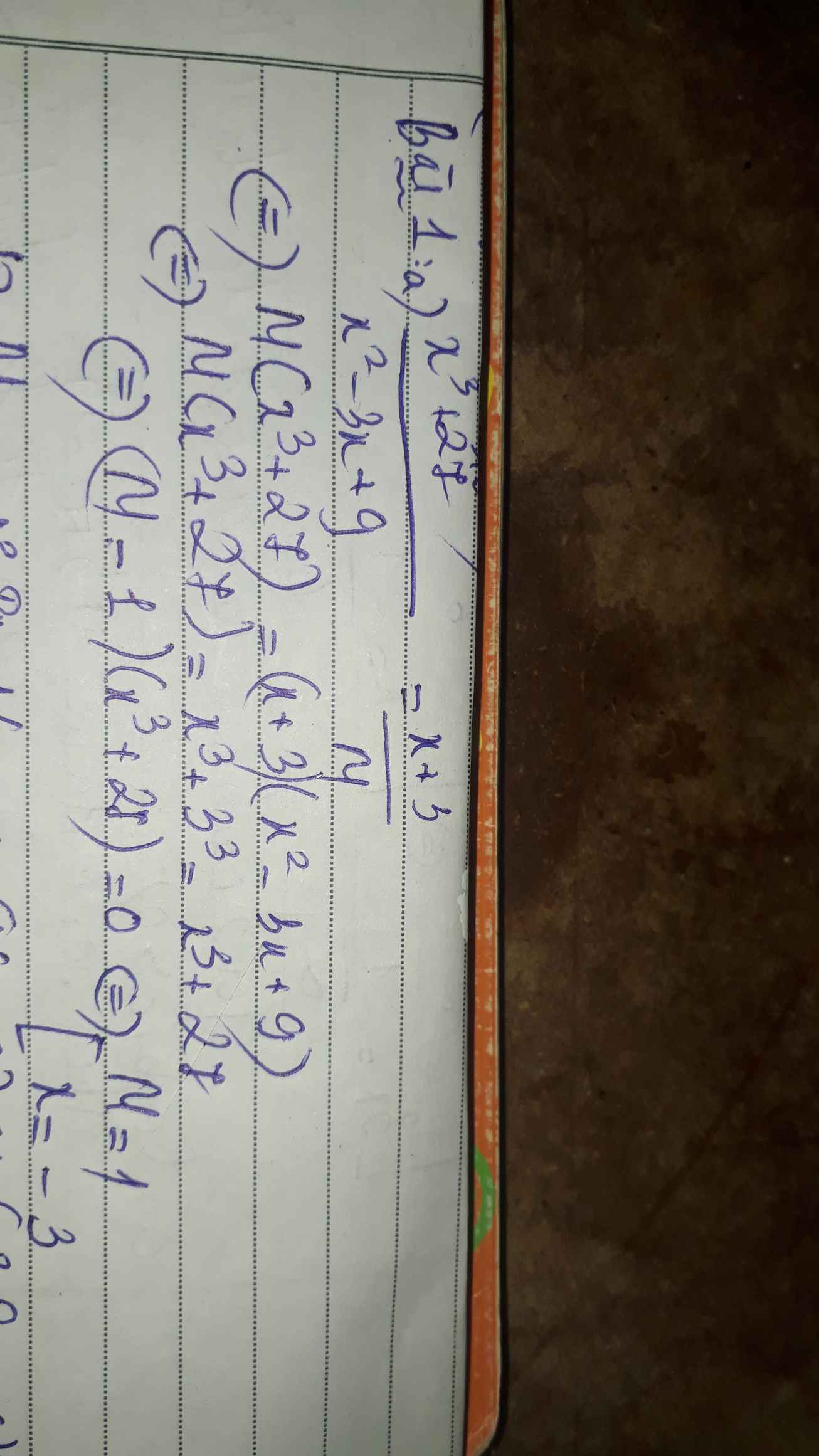Hãy nhập câu hỏi của bạn vào đây, nếu là tài khoản VIP, bạn sẽ được ưu tiên trả lời.

Đây là bài giải pt chứ có phải biểu thức đâu mà thu gọn hả bạn?
Lời giải:
a. ĐKXĐ: $x\neq 1$
PT $\Leftrightarrow \frac{x^2+x+1}{(x-1)(x^2+x+1)}+\frac{2x(x-1)}{(x-1)(x^2+x+1)}=\frac{3x^2}{(x-1)(x^2+x+1)}$
$\Leftrightarrow x^2+x+1+2x(x-1)=3x^2$
$\Leftrightarrow 3x^2-x+1=3x^2$
$\Leftrightarrow x=1$ (không thỏa đkxđ)
Vậy pt vô nghiệm.
b. ĐKXĐ: $x\neq \pm 3$
PT $\Leftrightarrow \frac{(x+2)(x+3)}{(x-3)(x+3)}=\frac{x^2+3x}{(x-3)(x+3)}$
$\Leftrightarrow (x+2)(x+3)=x^2+3x$
$\Leftrightarrow x^2+5x+6=x^2+3x$
$\Leftrightarrow 2x+6=0$
$\Leftrightarrow x=-3$ (không thỏa mãn đkxđ)
Do đó pt vô nghiệm.
c. ĐKXĐ: $x\neq \pm 2$
PT $\Leftrightarrow \frac{(x-2)^2-(x+2)^2}{(x+2)(x-2)}=\frac{-16}{(x-2)(x+2)}$
$\Leftrightarrow (x-2)^2-(x+2)^2=-16$
$\Leftrightarrow -8x=-16$
$\Leftrightarrow x=2$ (vi phạm đkxđ)
Do đó pt vô nghiệm.

\(A=\dfrac{2}{x^2+2x}+\dfrac{2}{x^2+6x+8}+\dfrac{2}{x^2+10x+24}+\dfrac{2}{x^2+14x+48}\)
\(A=\dfrac{2}{x\left(x+2\right)}+\dfrac{2}{\left(x+2\right)\left(x+4\right)}+\dfrac{2}{\left(x+4\right)\left(x+6\right)}+\dfrac{2}{\left(x+6\right)\left(x+8\right)}\)
\(A=\dfrac{1}{x}-\dfrac{1}{x+2}+\dfrac{1}{x+2}-\dfrac{1}{x+4}+\dfrac{1}{x+4}-\dfrac{1}{x+6}+\dfrac{1}{x+6}-\dfrac{1}{x+8}\)
\(A=\dfrac{1}{x}-\dfrac{1}{x+8}=\dfrac{x+8}{x\left(x+8\right)}-\dfrac{x}{\left(x+8\right)}=\dfrac{8}{x\left(x+8\right)}\)
\(B=\dfrac{1}{1-x}+\dfrac{1}{1+x}+\dfrac{2}{1+x^2}+\dfrac{4}{1+x^4}+\dfrac{8}{1+x^8}+\dfrac{16}{1+x^{16}}\)
\(B=\dfrac{2}{1-x^2}+\dfrac{2}{1+x^2}+\dfrac{4}{1+x^4}+\dfrac{8}{1+x^8}+\dfrac{16}{1+x^{16}}\)
\(B=\dfrac{4}{1-x^4}+\dfrac{4}{1+x^4}+\dfrac{8}{1+x^8}+\dfrac{16}{1+x^{16}}\)
\(B=\dfrac{8}{1-x^8}+\dfrac{8}{1+x^8}+\dfrac{16}{1+x^{16}}\)
\(B=\dfrac{16}{1-x^{16}}+\dfrac{16}{1+x^{16}}\)
\(B=\dfrac{32}{1-x^{32}}\)

1: Ta có: \(\dfrac{-3}{x-4}-\dfrac{3-5x}{x^2-16}=\dfrac{1}{x+4}\)
Suy ra: \(-3\left(x+4\right)-3+5x=x-4\)
\(\Leftrightarrow-3x-12-3+5x-x+4=0\)
\(\Leftrightarrow x=11\left(nhận\right)\)
2. ĐKXĐ: $x\neq \pm 2$
PT \(\Leftrightarrow \frac{3(x-2)}{(2+x)(x-2)}-\frac{x-1}{(x-2)(x+2)}=\frac{2(x+2)}{(x-2)(x+2)}\)
\(\Leftrightarrow \frac{3(x-2)-(x-1)}{(x-2)(x+2)}=\frac{2(x+2)}{(x-2)(x+2)}\)
\(\Rightarrow 3(x-2)-(x-1)=2(x+2)\)
\(\Leftrightarrow 2x-5=2x+4\Leftrightarrow 9=0\) (vô lý)
Vậy pt vô nghiệm

1: Ta có: \(\dfrac{3}{x-3}+\dfrac{4}{x+3}=\dfrac{3x-7}{x^2-9}\)
\(\Leftrightarrow\dfrac{3x+9}{\left(x-3\right)\left(x+3\right)}+\dfrac{4x-12}{\left(x-3\right)\left(x+3\right)}=\dfrac{3x-7}{\left(x-3\right)\left(x+3\right)}\)
Suy ra: \(3x+9+4x-12=3x-7\)
\(\Leftrightarrow4x=-7+12-9=-4\)
hay \(x=-1\left(nhận\right)\)
2: Ta có: \(\dfrac{3}{x-4}-\dfrac{4}{x+4}=\dfrac{3x-4}{x^2-16}\)
\(\Leftrightarrow\dfrac{3x+12}{\left(x-4\right)\left(x+4\right)}-\dfrac{4x-16}{\left(x+4\right)\left(x-4\right)}=\dfrac{3x-4}{\left(x-4\right)\left(x+4\right)}\)
Suy ra: \(3x+12-4x+16=3x-4\)
\(\Leftrightarrow28-4x=-4\)
\(\Leftrightarrow4x=32\)
hay \(x=8\left(tm\right)\)
3: Ta có: \(\dfrac{5x^2-12}{x^2-1}+\dfrac{3}{x-1}=\dfrac{5x}{x+1}\)
Suy ra: \(5x^2-12+3x+3=5x^2-5x\)
\(\Leftrightarrow3x-9+5x=0\)
\(\Leftrightarrow8x=9\)
hay \(x=\dfrac{9}{8}\left(nhận\right)\)

a, \(\dfrac{x^3+27}{x^2-3x+9}=\dfrac{x+3}{M}\Leftrightarrow\dfrac{\left(x+3\right)\left(x^2-3x+9\right)}{x^2-3x+9}=\dfrac{x+3}{M}\)
\(\Rightarrow M=\dfrac{x+3}{x+3}=1\)
b, \(\dfrac{M}{x+4}=\dfrac{x^2-8x+16}{16-x^2}=\dfrac{\left(x-4\right)^2}{\left(4-x\right)\left(x+4\right)}=\dfrac{4-x}{x+4}\)
\(\Rightarrow M=\dfrac{\left(4-x\right)\left(x+4\right)}{x+4}=4-x\)
c, tương tự

a/ \(\dfrac{3-x}{12}=\dfrac{2x+2}{8}\)
\(< =>\dfrac{2\left(3-x\right)}{24}=\dfrac{3\left(2x+2\right)}{24}\)
\(< =>6-2x-6x-6=0\)
\(< =>-8x=0\)
\(< =>x=0\)
Vậy tập nghiệm.....
b/ \(\dfrac{x+3}{x-4}+\dfrac{x-3}{x+4}=\dfrac{2\left(x^2+12\right)}{x^2-16}\)
Tìm ĐKXĐ của pt là: \(x\ne\pm4\) (làm tắt, bạn làm rõ ra nhé)
\(\dfrac{x+3}{x-4}+\dfrac{x-3}{x+4}=\dfrac{2\left(x^2+12\right)}{x^2-16}\)
\(< =>\dfrac{\left(x+3\right)\left(x+4\right)}{\left(x-4\right)\left(x+4\right)}+\dfrac{\left(x-3\right)\left(x-4\right)}{\left(x-4\right)\left(x+4\right)}=\dfrac{2\left(x^2+12\right)}{\left(x+4\right)\left(x-4\right)}\)
\(< =>x^2+3x+4x+12+x^2-3x-4x+12-2x^2-24=0\)
\(< =>0x=0\)
=> x có vô số nghiệm
Vậy ....
a) `(3-x)/12=(2x+2)/8`
`<=> (3-x)/12 =(x+1)/4`
`<=> 3-x=3(x+1)`
`<=>3-x=3x+3`
`<=> x=0`
Vậy `S={0}`.
b) ĐK: `x \ne \pm 4`
`(x+3)/(x-4)+(x-3)/(x+4)=(2(x^2+12))/(x^2-16)`
`<=> (x+3)(x+4)+(x-3)(x-4)=2(x^2+12)`
`<=> x^2+7x+12+x^2-7x+12=2x^2+24`
`<=> 0x=0`
Vậy PT có nghiệm với mọi x thỏa mãn điều kiện.

d: ĐKXĐ: \(x\notin\left\{2;-3\right\}\)
\(\dfrac{1}{x-2}-\dfrac{6}{x+3}=\dfrac{5}{6-x^2-x}\)
=>\(\dfrac{1}{x-2}-\dfrac{6}{x+3}=\dfrac{-5}{\left(x+3\right)\left(x-2\right)}\)
=>\(x+3-6\left(x-2\right)=-5\)
=>x+3-6x+12=-5
=>-5x+15=-5
=>-5x=-20
=>x=4(nhận)
e: ĐKXĐ: x<>-2
\(\dfrac{2}{x+2}-\dfrac{2x^2+16}{x^3+8}=\dfrac{5}{x^2-2x+4}\)
=>\(\dfrac{2}{x+2}-\dfrac{2x^2+16}{\left(x+2\right)\left(x^2-2x+4\right)}=\dfrac{5}{x^2-2x+4}\)
=>\(2\left(x^2-2x+4\right)-2x^2-16=5\left(x+2\right)\)
=>\(2x^2-4x+8-2x^2-16=5x+10\)
=>5x+10=-4x-8
=>9x=-18
=>x=-2(loại)
f: ĐKXĐ: \(x\in\left\{1;-1\right\}\)
\(\dfrac{x+1}{x^2+x+1}-\dfrac{x-1}{x^2-x+1}=\dfrac{2\left(x+2\right)^2}{x^6-1}\)
\(\Leftrightarrow\dfrac{x+1}{x^2+x+1}-\dfrac{x-1}{x^2-x+1}=\dfrac{2\left(x+2\right)^2}{\left(x-1\right)\left(x+1\right)\left(x^2+x+1\right)\left(x^2-x+1\right)}\)
=>\(\dfrac{\left(x+1\right)\left(x^2-x+1\right)\left(x^2-1\right)-\left(x-1\right)\left(x^2+x+1\right)\left(x^2-1\right)}{\left(x-1\right)\left(x+1\right)\left(x^2+x+1\right)\left(x^2-x+1\right)}=\dfrac{2\left(x+2\right)^2}{\left(x-1\right)\left(x+1\right)\left(x^2+x+1\right)\left(x^2-x+1\right)}\)
=>\(\left(x^3+1\right)\left(x^2-1\right)-\left(x^3-1\right)\left(x^2-1\right)=2\left(x^2+4x+4\right)\)
=>\(\left(x^2-1\right)\cdot\left(x^3+1-x^3+1\right)=2\left(x^2+4x+4\right)\)
=>\(2x^2+8x+8=\left(x^2-1\right)\cdot2=2x^2-2\)
=>8x=-10
=>x=-5/4(nhận)

1: Ta có: \(\dfrac{5x^2-12}{x^2-1}+\dfrac{3}{x-1}=\dfrac{5x}{x+1}\)
\(\Leftrightarrow\dfrac{5x^2-12}{\left(x-1\right)\left(x+1\right)}+\dfrac{3x+3}{\left(x-1\right)\left(x+1\right)}=\dfrac{5x^2-5x}{\left(x+1\right)\left(x-1\right)}\)
Suy ra: \(5x^2+3x-9=5x^2-5x\)
\(\Leftrightarrow8x=9\)
hay \(x=\dfrac{9}{8}\left(tm\right)\)
2: Ta có: \(\dfrac{3}{x-5}-\dfrac{15-3x}{x^2-25}=\dfrac{3}{x+5}\)
\(\Leftrightarrow\dfrac{3x+15}{\left(x-5\right)\left(x+5\right)}+\dfrac{3x-15}{\left(x-5\right)\left(x+5\right)}=\dfrac{3x-15}{\left(x+5\right)\left(x-5\right)}\)
Suy ra: \(6x=3x-15\)
\(\Leftrightarrow3x=-15\)
hay \(x=-5\left(loại\right)\)
2. ĐKXĐ: $x\neq \pm 5$
PT \(\Leftrightarrow \frac{3}{x-5}+\frac{3x-15}{x^2-25}=\frac{3}{x+5}\)
\(\Leftrightarrow \frac{3}{x-5}+\frac{3(x-5)}{(x-5)(x+5)}=\frac{3}{x+5}\)
\(\Leftrightarrow \frac{3}{x-5}+\frac{3}{x+5}=\frac{3}{x+5}\Leftrightarrow \frac{3}{x-5}=0\) (vô lý)
Vậy pt vô nghiệm.

a: \(=\dfrac{4x^3+8x^2-11x+3-\left(x^2-5\right)\left(2x-1\right)-2x^3-5x^2+x+1}{\left(2x-1\right)^3}\)
\(=\dfrac{2x^3+3x^2-10x+4-2x^3+x^2+10x-5}{\left(2x-1\right)^3}\)
\(=\dfrac{4x^2-1}{\left(2x-1\right)^3}=\dfrac{2x+1}{\left(2x-1\right)^2}\)
b: \(=\dfrac{1+x+1-x}{1-x^2}+\dfrac{2}{1+x^2}+\dfrac{4}{1+x^4}+\dfrac{8}{1+x^8}+\dfrac{16}{1+x^{16}}\)
\(=\dfrac{2+2x^2+2-2x^2}{1-x^4}+\dfrac{4}{1+x^4}+\dfrac{8}{1+x^8}+\dfrac{16}{1+x^{16}}\)
\(=\dfrac{4+4x^4+4-4x^4}{1-x^8}+\dfrac{8}{1+x^8}+\dfrac{16}{1+x^{16}}\)
\(=\dfrac{8+8x^8+8-8x^8}{1-x^{16}}+\dfrac{16}{1+x^{16}}\)
\(=\dfrac{32}{1+x^{32}}\)

đk x khác -2;2
\(\Leftrightarrow\dfrac{\left(x+2\right)^2-\left(x-2\right)^2}{\left(x-2\right)\left(x+2\right)}=\dfrac{16}{x^2-4}\)
\(\Rightarrow\left(x+2-x+2\right)\left(x+2+x-2\right)=16\Leftrightarrow2x=4\Leftrightarrow x=2\)(ktm)
Vậy pt vô nghiệm
ĐKXĐ: $x\ne\pm2$
$\frac{x+2}{x-2}-\frac{x-2}{x+2}=\frac{16}{x^2-4}$
$\Leftrightarrow \frac{(x+2)^2}{(x-2)(x+2)}-\frac{(x-2)^2}{(x-2)(x+2)}=\frac{16}{(x-2)(x+2)}$
$\Rightarrow (x+2)^2-(x-2)^2=16$
$\Leftrightarrow x^2+4x+4-x^2+4x-4=16$
$\Leftrightarrow 8x=16$
$\Leftrightarrow x=2$ (tm ĐKXĐ)
#$\mathtt{Toru}$